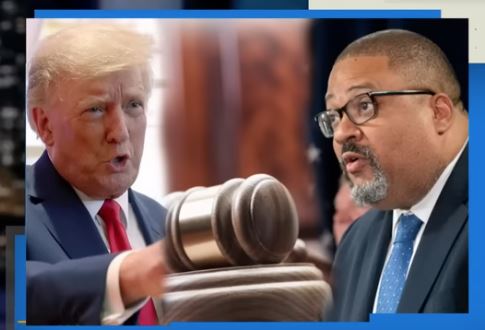In the ongoing legal saga surrounding Donald Trump’s ‘hush money’ case, Manhattan District Attorney Alvin Bragg has firmly positioned himself against the dismissal of the charges. On a recent Tuesday, Judge Juan Merchan, who is overseeing the proceedings, opted to suspend any immediate decisions regarding the direction of the case, indicating that further legal deliberations are necessary before moving forward. The delay reflects the complex legal landscape that surrounds a former president facing criminal charges, particularly when considerations regarding the timing of proceedings and sentencing timelines come into play. While Bragg’s office has expressed intentions to oppose any efforts to dismiss the case outright, they have also suggested a postponement of Trump’s sentencing, indicating a willingness to explore alternative options given the unique circumstances.
In a strategic filing, prosecutors argued for the necessity of balancing constitutional interests, especially considering the unprecedented scenario of a sitting president navigating a criminal trial. They proposed that all remaining proceedings related to the case could ideally be deferred until after the conclusion of Trump’s forthcoming presidential term. This proposal is significant not only because it acknowledges the legal complexities involved but also because it reflects the respect for the institution of the presidency that the DA’s office claims to uphold. The need for such a proposal underscores the unique nature of the legal proceedings that are unfolding, characterized by an intersection of law, politics, and public sentiment.
While the prosecution has expressed a clear intent to challenge Trump’s bid for dismissal, they also recognize the uncharted territory they are navigating, particularly when it comes to sentencing a former president. Their acknowledgment of the unique legal and ethical considerations surrounding the case has prompted them to suggest delaying any definitive sentencing until after Trump’s term ends. This approach appears aimed at minimizing the potentially disruptive implications of convicting or sentencing a president-elect, thereby attempting to maintain the balance between the rule of law and the protocols surrounding the presidency.
The legal tussles surrounding this case reveal broader implications for the integrity of the adjudicative process, especially concerning how justice is administered when political figures are involved. The Manhattan DA’s office has been keen to underline their respect for the jury’s role within the constitutional framework, viewing it as a paramount component of justice. The intricacies of the case raise critical questions about how accountability is executed in the face of political power, and to what extent procedural norms can be upheld while addressing allegations against a figure as prominent as Trump.
The judge’s decision to adjourn proceedings signifies a recognition of the complexities at play. By postponing immediate legal judgments, Merchan is providing the parties involved additional time to prepare their arguments and consider the implications of the case moving forward. This pause could be seen as a strategic move to gather further evidence, additional legal opinions, or even public sentiment, which could disproportionately influence the outcome of these proceedings. The transparency and fairness of the judicial process are essential, particularly in a case that has galvanized public interest and opposition.
As the case unfolds, it will be pivotal to monitor how legal arguments are shaped in this unprecedented context. The dialogues between the prosecution and the defense will likely serve as a benchmark for future cases that blend legal accountability with political maneuverings. The implications of Judge Merchan’s ultimate decisions will reverberate beyond this case, potentially influencing how future legal cases involving political figures are managed, opening a pathway for examining the dynamic relationship between law, accountability, and the office of the presidency itself.

